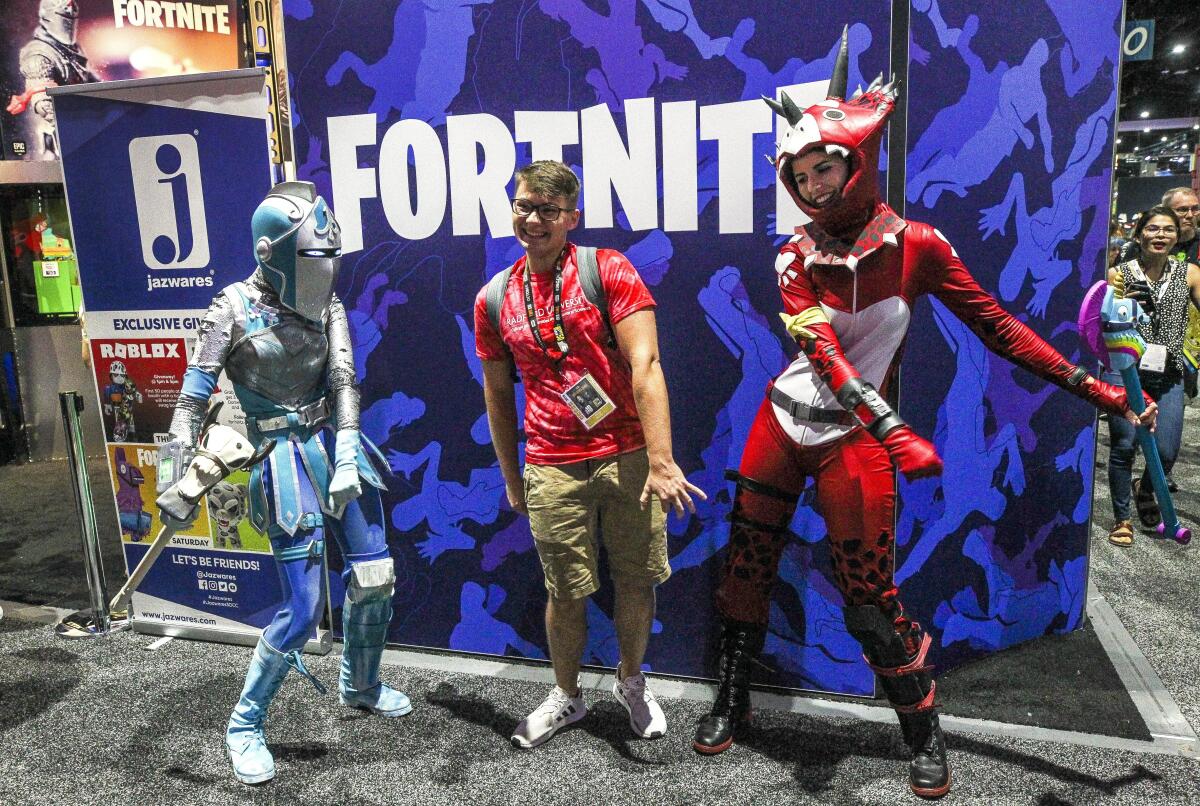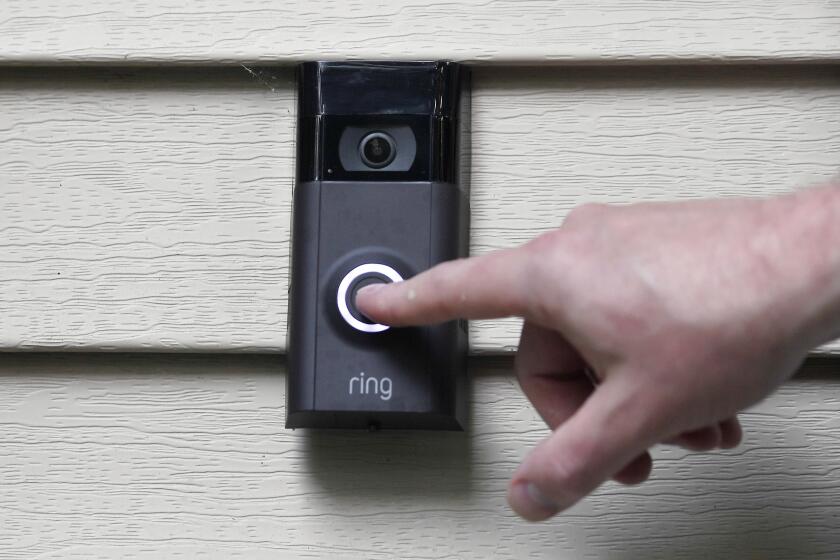Google loses antitrust fight with ‘Fortnite’ maker Epic Games

- Share via
Google’s mobile app store maintains a monopoly in the market for distribution of programs and payments on its Android software, a federal jury in California has decided, dealing a blow to the technology giant in a high-stakes antitrust battle with Epic Games Inc.
The internet giant’s Play store willfully wields monopoly power through the Alphabet Inc. unit’s anti-competitive conduct, jurors found Monday after deliberating less than four hours following a nearly monthlong trial in San Francisco.
The ruling could potentially jeopardize billions of dollars of revenue generated by Google’s app store. Epic largely lost a similar challenge to Apple Inc.’s app store two years ago.
U.S. District Judge James Donato, who oversaw the trial, will decide whether Google must open the door for payment and app distribution methods outside its own app store after the verdict that Google Play policies are unlawful.
Google, whose shares slipped 0.8% Tuesday to $133.64, said it plans to challenge the verdict.
The holiday season is here, and with it ubiquitous guides to smart gadgets and tech toys. But what about the products we’re better off without? Our experts weigh in.
“Android and Google Play provide more choice and openness than any other major mobile platform,” said Wilson White, Google’s vice president of government affairs and public policy. “The trial made clear that we compete fiercely with Apple and its App Store, as well as app stores on Android devices and gaming consoles.”
Tim Sweeney, chief executive of Epic, flashed a slight smile as he sat in the front row of the public seating area of the courtroom after the verdict was read.
Sweeney quickly hailed the ruling on social network X, writing: “Victory over Google! After 4 weeks of detailed court testimony, the California jury found against the Google Play monopoly on all counts. The Court’s work on remedies will start in January. Thanks for everyone’s support and faith! Free Fortnite!”
Stanford University law professor Mark Lemley said the verdict “has the potential to be a very big deal — not just for Epic, which will get the ability to sell directly on Android phones — but for the entire internet.”
“The last two decades have seen a profound shift away from the open internet towards walled gardens,” he said. “That is one of the things that has kept the internet market so concentrated. This verdict just knocked a big hole in the garden wall.”
Joy Buolamwini, author of “Unmasking AI: My Mission to Protect What Is Human in a World of Machines,” joins the L.A. Times Book Club on Nov. 14.
Lawyer Paul Swanson, a partner at Holland & Hart who specializes in technology and antitrust law, said “a sweeping verdict like this is going to be hard for Google to undo in post-trial proceedings or on appeal.”
Epic sued Google three years ago, alleging the tech company monopolized the Android app distribution market for more than a decade by striking side deals with rivals and using its resources to thwart competition.
In its defense, Google contended that its partnerships help phones that run on the Android operating system better compete against smartphone market rival Apple’s iPhone.
“Epic wants you to give them a deal that they don’t have and they haven’t been able to get anywhere else,” Jonathan Kravis, a lawyer for Google, told the jury in his closing argument. “A deal that would effectively let them use the Play Store for free.”
Epic was the only stakeholder to challenge Alphabet at trial after the Mountain View, Calif.-based company recently reached settlements with consumers, state attorneys general and Match Group Inc., all of whom had targeted Google Play policies in complaints.
The trial featured testimony from both Sweeney and Alphabet CEO Sundar Pichai, along with a handful of high-ranking executives from Google and several antitrust law experts.
Nine jurors — three women and six men — were shown numerous documents as evidence, including confidential internal Google email communications and presentations, which revealed the inner workings of its efforts to build out Google Play and its Android mobile operating system business.
Jurors found that Google unreasonably restrained trade by sharing Google Play revenue with mobile device manufacturers so its own store was the default store on Android smartphone home screens. Google also made million-dollar deals with game makers including Activision Blizzard before it was acquired by Microsoft Corp. — which Epic argued dissuaded the game companies from launching their own stores.
The panel also concluded that Google limited trade through its developer agreements that Epic contended make it challenging for users to directly download apps from the web to mobile devices. The accords also stopped developers from telling Android phone users that their products and services may be available at a lower price on their websites.
Alphabet had countersued Epic, alleging the game maker breached its contract and acted in bad faith when it tried to set up its own app store in 2020 as an end run around the Google Play billing system.
But after testimony by Epic executives at trial admitting that they tried to sidestep the Play store, Donato decided that jurors would skip ruling on Google’s counterclaims.
More to Read
Inside the business of entertainment
The Wide Shot brings you news, analysis and insights on everything from streaming wars to production — and what it all means for the future.
You may occasionally receive promotional content from the Los Angeles Times.








